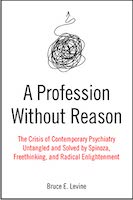The APA’s Apology for Racism Omits Psychiatry’s Essential Bigotry
In 2021, the American Psychiatric Association (APA), the guild of U.S. psychiatrists, acknowledged its history of racism. However, it is difficult to imagine how psychiatry will ever acknowledge that its entire edifice is built on a fundamental bigotry. Bigotry is defined by Merriam-Webster as: “obstinate or intolerant devotion to one’s own opinions and prejudices.” Racism […]
Once Radical Critiques of Psychiatry are Now Mainstream, So What Remains Taboo?
One need not be a Marxist to acknowledge the logic behind Karl Marx’s observation: “The ideas of the ruling class are in every epoch the ruling ideas.” It is especially important for the ruling class that the general public’s ideas about our emotional suffering and behavioral disturbances be the ideas of the ruling class. Twenty […]
From Peer Support to Psychedelics: Psychiatry’s Co-Optation & De-Radicalization
How can psychiatry co-opt the psychedelic underground subculture, discard its radical anti-authoritarian message of rejecting a dehumanizing society, retake psychiatry’s lost power and authority, and make both drug companies and the ruling elite happy? To strip psychedelic use down to its chemicals is to de-radicalize its communal and anti-authoritarian roots.
From Nazi Blitzkriegs to ADHD Treatment: What Stimulant Drugs Can and Cannot Do
When humans are forced to be cogs in a machine—be it a war machine, a workplace machine, or a school machine—we need to become more machinelike, which can be expedited by some psychostimulant drugs. Commonly used legal psychostimulants are caffeine, nicotine, methylphenidate (including Ritalin) amphetamine (including Adderall), and methamphetamine, all of which may help us better attend to boring and unpleasant tasks. With caffeine and nicotine, we are likely to retain our emotional awareness; however, with methylphenidate, amphetamine, and methamphetamine, our angst or anguish can be eliminated—making these three drugs better suited to create efficient cogs in war, workplace, and school machines.
Leading Psychiatrists Unwittingly Acknowledge Psychiatry is a Religion, Not a Science
Since the seventeenth century, Enlightenment thinkers have distinguished science from religion, and by at least one critical distinction, leading psychiatrists have unwittingly acknowledged that major constructs in contemporary psychiatry are religious ideas, not scientific ones.
The New York Times Uncritically Repeats Discredited Antidepressant Claims
Furthermore, if all one knew about the serotonin imbalance theory of depression was from that November 9, 2022 New York Times article, one would believe that psychiatry has long known it was untrue but is not responsible for the fact that much of the general public has been unaware that it was disproven decades ago.
No Evidence for Psychiatry’s Depression Claims, Report Three 2022 Research Reviews
According to three 2022 comprehensive research reviews, there is no scientific evidence for what we have long been told by psychiatry—and the mainstream media—about the neurobiology of depression. These reviews, in unison, will pack a powerful wallop for critical thinkers. However, for American society in general, the deck is stacked against any scientific truths making […]
Psychiatry’s Nightmarish 2022 & Its Hysterical Defense Against Criticism
So in 2022, research reviews published in prestigious journals have made it clear that there is no neurobiological evidence—no chemical imbalance, no brain structure evidence—for any psychiatric condition.
Taxpayers Deserve Compensation from Naming-Rights Deals
If Cincinnati Enquirer blocks connecting to this article without a subscription, GO TO September 13 Blog: “New Norms, Naming Rights, Paycor, and Ronald Reagan.”
What Liberal Admonishers of Left Psychiatry Critics Get Wrong
The primary reason why there are today so many Left-identified ex-psychiatric patients and practitioners such as myself—along with research scientists and investigative journalists—who are critical of the institution of psychiatry is that psychiatry has done an increasingly lousy job in helping people.




